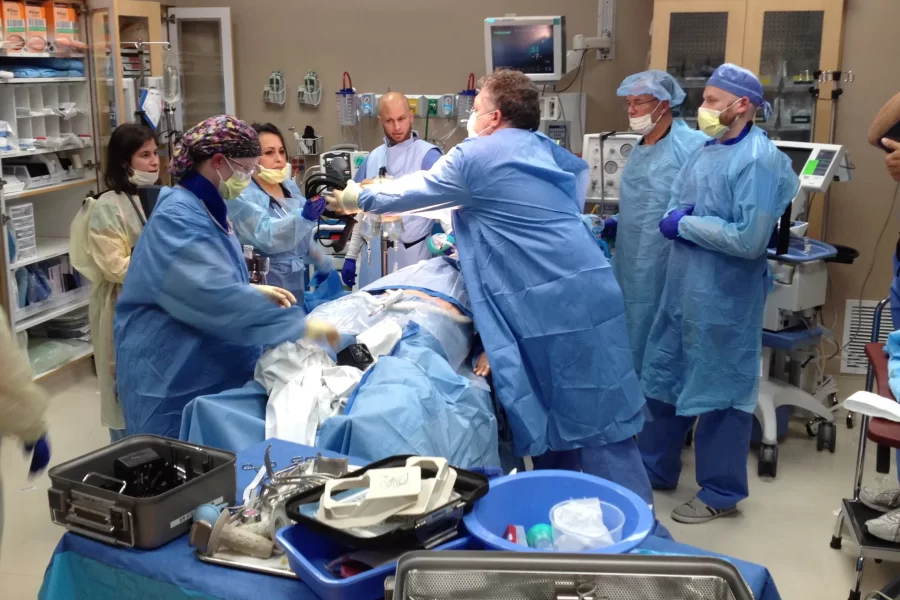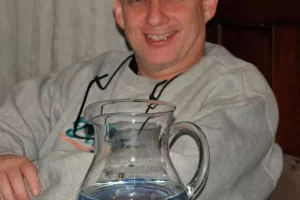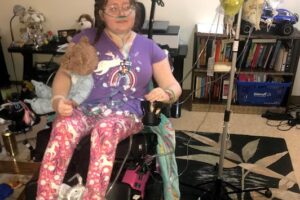An Ambulance Ride at 2 AM for Dysautonomia
It was like deja vu when EMS raced me back into one of the critical care rooms as soon as the ambulance pulled up at Berkshire Medical Center’s ER. It was the night my dysautonomia had flared up without warning and I had woken up at 2 AM with a heart rate of 178 and an oxygen level of 86%.
The room was already filled with people as EMS used the sheets, already underneath me from my bed at home, to slide me over to the gurney in the trauma room. Even though I was on my baseline of 3 L of oxygen, on the ambulance ride to the hospital my oxygen saturation steadily dropped. This was even after they turned me up to 4 L.
The original doctor in the ER recognized me and remembered I had dysautonomia. He poured four liters of IV fluids into me to get my blood pressure up. Then they gave me repeat doses of metoprolol to bring my heart rate down. Of course, the metoprolol then tanked my already low blood pressure that we had worked so hard to get back up.
Even for someone with dysautonomia, my blood pressures were low. The medical team couldn’t figure out how I was still conscious with them registering as low as mine were. They were reading so low that they checked them manually several times to confirm.

Even People With Dysautonomia Don’t Have Resting Heart Rates in the 150s
To get my blood pressure back up the nurses came in to load me up with pressors (medication that causes your blood vessels to constrict to bring up dangerously low blood pressures). My heart rate finally came down into the 150s.
“I have a disease called small fiber autonomic polyneuropathy,” I tried to explain to one of the newer doctors left in the room. “It’s a very rare and severe form of dysautonomia. It basically means my unconscious nervous system doesn’t work right.
I tried to explain this so that they would better understand the full picture and the severity of my dysautonomia, but it backfired,
They told me that 150s was my baseline heart rate. I knew this wasn’t true. low to mid 120s was my baseline heart rate. A normal person’s heart rate was anywhere from 60 to 100 beats per minute.
“Since your heart rate is normal now, we think we can discharge you home. There’s no point in keeping you here if all your vitals are normal.” This different doctor I’d never met before, informed me as people filtered out of the trauma room and the heart monitor squawking became less frenetic.
A Doctor Trying His Hardest to Kill Me
“But I just had a heart rate as high as 180 and a blood pressure as low as 64/32,” I said incredulously.
“Well, you did, but it’s resolved now, we have no grounds to admit you, your insurance company wouldn’t pay for a stay in the hospital,” the doctor told me, his fingers tapped the recording device he was holding and he kept looking at his beeper and back over his shoulder. He was itching to get out of the room and go see the next patient.
“But 150 is still a way too high pulse, that’s enough grounds to admit me and look for the cause of why my heart rate is so high,” I tried to get through to him.
“You have dysautonomia, your vital signs are never going to be normal again.” The doctor told me. “I have to go, the nurse will get you dressed and bring in your discharge paperwork.”
Dysautonomia Too Uncontrolled to go Home
The doctor immediately turned on his heels and power walked out of the room. I sat on the bed in total shock. Once again, my body felt like I’d gotten run over by a truck several times. Almost afraid to see the numbers, I looked at the heart monitor above my bed. My heart was tacking away at 150 beats per minute and my oxygen level was only 91% even though I was on 4 liters of oxygen, and that was through an oxygen mask, not even a nasal cannula. My blood pressure was only 88/54. These were signs of wildly uncontrolled dysautonomia that could have lethal effects, and they were going to discharge me.
This scared me a little bit, and I didn’t know what to do.
Just then my phone rang, I was going to ignore it because I just felt so completely drained out that I didn’t really have the energy to talk to anyone, but then I saw that it was Jeff calling, so I answered.

Jeff and His Emergency Back Up Plan
“I saw an ambulance near your house,” he said. “Are you okay?”
“I’m at the ER,” I told him. “But they’re discharging me soon.”
“Oh, thank God,” he said.
“No, it’s not good,” I said.
“What do you mean?” he asked.
“My heart is beating way, way too fast. Like dangerously too fast. My oxygen levels are low even though I’m on 4 liters of oxygen through a mask, and my blood pressure is bordering on low. As soon as I pee out all of the fluids they used to get my blood pressure up from 64/32, it will bottom back out again. On top of all that, I feel spacy and far away and out of it,” I explained.

“What are you going to do?” Jeff asked.
“I don’t know what I can do, but I’m really scared,’ I admitted.
“Maybe could you go to a different hospital?” asked Jeff.
“That’s actually a really good idea, but I don’t know how I would get there?”
“You would have to let Berkshire Medical Center discharge you and give you an ambulance ride home, and then you could see if maybe Lauren or Melody could drive you to Baystate Medical Center,” Jeff suggested.
“Do you really think they’d do that for me?” I asked.
“You might have to pay them some money for gas, but if you die, they’re out of a job, so yeah I think they’d probably do that for you,” Jeff told me.
“Okay, let me call them right now.”
Discharging From Berkshire Murder Center
The nurse came in to have me sign the discharge paperwork and then I called and texted Melody over and over until I got a hold of her. Lauren was acting kind of sketchy, something about needing to go visit her boyfriend in New York City.
Melody was outraged that Berkshire Medical Center was being so incompetent and immediately agreed to drive me the hour drive down to Baystate Medical Center. She didn’t even ask for any gas money. I told her I would give her $20 anyway.
The ambulance brought me home and Melody met me at the house.

Prepping to Get My Life-Threatening Dysautonomia Treated
“You look awful,” she told me.
“Geez, thanks,” I said.
“No I just mean you look really sick,” she clarified.
“I know, I know,” I told her. “Dysautonomia is the misfiring of the unconcsious nervous system. Our unconscious nervous system is in charge of all of your most important bodliy functions that keep us alive, and mine is completely malfunctioning.”
“I know, Berkshire Murder Center needs to be shut down,” agreed Melody. “They’re a joke.”
We threw together a little hospital go-bag with deodorant, my laptop and charger, my phone and phone charger, a few outfits with socks and underwear, and a couple of Build-a-bears with a couple of extra outfits and their mini brands. We also grabbed my med bag for the ride down, my purse, a coloring book and markers, and my toothbrush and toothpaste. Hospitals are notorious for having lousy cheap plastic toothbrushes and gross toothpaste.

Then Melody changed over my IV bags and tube feeding bag. While she gave me morning meds through my J tube I pushed my IV meds through my PICC line at the same time, and then she loaded me into her car for the hour-long drive down to Baystate Medical Center.
Racing Against Time Down to the Hospital
Melody was trying to talk to me during the ride down but I kept feeling a pull toward darkness. Every once in a while she would have me use my pulse oximeter to check my vital signs. We had brought both my portable oxygen concentrators with us. Right then I was using it at 4 liters and my oxygen level was only 84%. My pulse was steadily climbing back up like I had been afraid it would.
When we started driving my pulse was 157, when we were halfway there it was 169. By the time we were pulling into the ER entrance of Baystate, it was back in the 170s. and I could feel my heart body-slamming my ribcage like it was in a cage match battle to the death. I was feeling farther away too, it was like I was underwater and everyone else was above the water, and any incoming sound was distorted. My movements were clumsy too, I only had partial control over them.
“I’m going to get them to bring a stretcher out here to wheel you inside,” Melody told me about five times before I comprehended what she was saying, once we pulled into the hospital.

Trying to Stay Conscious
I nodded and said “okay” but the word came out distorted and distant. The effects of the dysautonomia was rapidly trying to pull me under
My eyes drifted shut until I felt the cool chill of the October air hit me as the passenger side door was opened and someone undid my seatbelt and told me they were going to get me out of the car and into the ER to start getting me feeling better.
Hands grabbed at me and at the IV bags and tube feed bags and bags with the pumps in them and my G tube drainage bag. I was lifted from the car onto the cool white sheets and they hung up all my bags on that tiny little IV pole on the stretcher that didn’t look like it would hold anything.
As soon as I was wheeled inside, I recognized that I was in another trauma room. They were asking me a lot of questions about my health history, what brought me there, and how I was feeling.

It was all so overwhelming, and that blackness just wanted to pull me under.
My Medical History Including My Dysautonomia
“Ask Melody,” I told them when they asked about my health history. Melody gave them the rundown on my history of my Cushing brain tumor, the form of dyautonomia I had that was called autoimmune-mediated Small Fiber Autonomic Polyneuropathy. She explained how it had caused gastroparesis then total digestive tract failure,. Then she ran down the list of the rest of my diagnoses ticking off:
- hypothyroid
- anemia
- seizures
- POTS (another form of dysautonomia)
- Stage II Kidney failure
- orthostatic hypotension
- hyperalgesia
- liver damage
- immune deficiency
- neurogenic bladder
- neurogenic bowels
- history of atrial fibrillation
- issues with temperature regulation
- constantly dilated pupils
- low lung volumes
- atelectasis – worse in the left lung
- asthma
- lack of ability to sweat
- history of ventricular tachycardia
- diabetes insipidus
Melody even gave them a copy of my medication list that she had printed out before we left for the hospital.
Getting Permission to Let Go
“How do you feel now?” the doctor asked me.
“Like total crap,” I told him, but my words came out all slurred and my lips were sticking to my teeth, so I was barely understandable. Another thing the dysautonomia did to me, was that it stopped me from producing saliva unless I constantly took little sips of Crystal Light all day long, or squirted Biotene, a liquid artifical saliva, that tasted minty, into my mouth.

“Well, we are going to figure out how to get you feeling better and you are definitely going to get admitted no matter what,” the doctor promised me.
His permission was all I needed, I let myself fall into the blackness that had been pulling at me.
Discover more from chronicallyalive.org
Subscribe to get the latest posts sent to your email.





